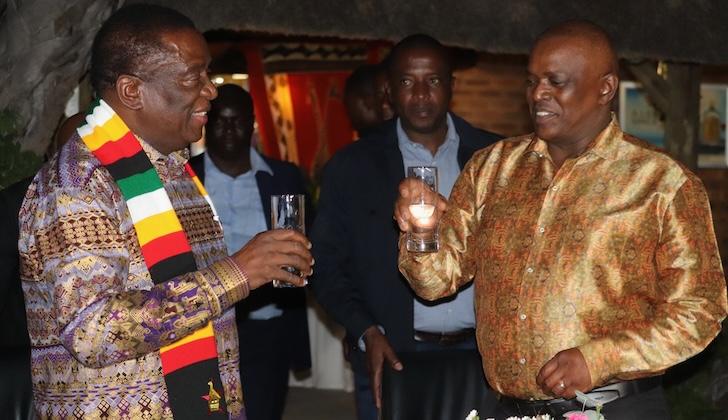News / Local
Botswana backlash to Zimbabwe border plan
27 Dec 2023 at 08:34hrs |
5 Views

A proposal by Zimbabwe's President Emmerson Mnangagwa and his Botswana counterpart Mokgweetsi Masisi to allow citizens to cross borders using national identity cards instead of passports has drawn heavy criticism in Botswana.
Speaking at a festival in Gaborone this month, Mnangagwa announced the deal to remove passport requirements, saying laws were being changed to facilitate it.
This provoked a public outcry in Botswana, forcing the labor minister to clarify to parliament no agreement is yet in place and procedures are still underway. Legislators accused Masisi of not consulting Botswana citizens who disagree with the move.
The idea of a borderless Africa is overdue, says international relations researcher Rodreck Matsveru, as colonial powers drew arbitrary borders to "divide and rule." He called the ID card proposal "noble."
Relations are warming between Mnangagwa and Masisi despite continued rights abuses and electoral fraud in Zimbabwe. Masisi endorsed Mnangagwa's disputed 2023 election win, although he did not attend his inauguration.
Some in Botswana believe Zimbabwe still has work to implement democratic values, says Matsveru, while Masisi seems sympathetic amid doubts by lawmakers.
But governance expert Dr. Wurayayi Zembe argues Mnangagwa's "ruthless dictatorship" makes the plan insincere, as Zimbabweans suffer under his "despotic rule." Scrapping passports should follow true integration, he says.
While some East African states remove visa requirements, Botswana lawmakers and citizens say dropping passports on the Zimbabwe border could increase illegal migration and job losses, mirroring South African xenophobia.
Botswana hosts the second largest Zimbabwean emigrant population after South Africa. Analysts expect more to seek refuge if borders open, potentially increasing crime.
For borderless Africa to work, African states need people's democracies addressing inequality, says Zembe. Open borders can expand markets, but Zimbabwe's economic crisis is fueling emigration.
Trade between Zimbabwe and Botswana has decreased in recent decades. 2021 data shows Botswana exporting $46.8m in goods to Zimbabwe, while imports reached just $31.8m.
Some Zimbabweans already travel to Botswana for affordable goods and healthcare as domestic systems collapse.
Speaking at a festival in Gaborone this month, Mnangagwa announced the deal to remove passport requirements, saying laws were being changed to facilitate it.
This provoked a public outcry in Botswana, forcing the labor minister to clarify to parliament no agreement is yet in place and procedures are still underway. Legislators accused Masisi of not consulting Botswana citizens who disagree with the move.
The idea of a borderless Africa is overdue, says international relations researcher Rodreck Matsveru, as colonial powers drew arbitrary borders to "divide and rule." He called the ID card proposal "noble."
Relations are warming between Mnangagwa and Masisi despite continued rights abuses and electoral fraud in Zimbabwe. Masisi endorsed Mnangagwa's disputed 2023 election win, although he did not attend his inauguration.
Some in Botswana believe Zimbabwe still has work to implement democratic values, says Matsveru, while Masisi seems sympathetic amid doubts by lawmakers.
But governance expert Dr. Wurayayi Zembe argues Mnangagwa's "ruthless dictatorship" makes the plan insincere, as Zimbabweans suffer under his "despotic rule." Scrapping passports should follow true integration, he says.
While some East African states remove visa requirements, Botswana lawmakers and citizens say dropping passports on the Zimbabwe border could increase illegal migration and job losses, mirroring South African xenophobia.
Botswana hosts the second largest Zimbabwean emigrant population after South Africa. Analysts expect more to seek refuge if borders open, potentially increasing crime.
For borderless Africa to work, African states need people's democracies addressing inequality, says Zembe. Open borders can expand markets, but Zimbabwe's economic crisis is fueling emigration.
Trade between Zimbabwe and Botswana has decreased in recent decades. 2021 data shows Botswana exporting $46.8m in goods to Zimbabwe, while imports reached just $31.8m.
Some Zimbabweans already travel to Botswana for affordable goods and healthcare as domestic systems collapse.
Source - zimive
Join the discussion
Loading comments…































